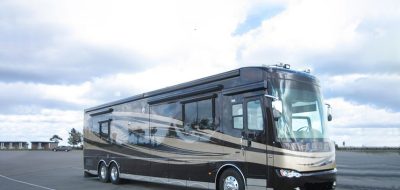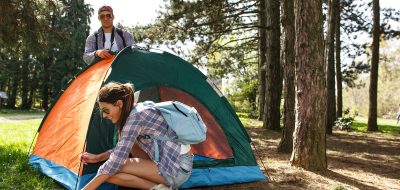 Wow! 33 comments as I sit down to write this entry. You have brought up great questions and many of you have already shared your experiences, support and encouragement to each other. I am overjoyed that there is this much interest in the subject. It will take quite a while to respond to all your concerns and requests so I am grateful to those of you who are offering great advice to each other. For those who want to get started and can’t wait until I cover all the topics, visit RVing Women for excellent information. Also my writing partner, Jaimie Hall-Bruzenak, and I wrote a book on Solo RVing available at our Web site.
Wow! 33 comments as I sit down to write this entry. You have brought up great questions and many of you have already shared your experiences, support and encouragement to each other. I am overjoyed that there is this much interest in the subject. It will take quite a while to respond to all your concerns and requests so I am grateful to those of you who are offering great advice to each other. For those who want to get started and can’t wait until I cover all the topics, visit RVing Women for excellent information. Also my writing partner, Jaimie Hall-Bruzenak, and I wrote a book on Solo RVing available at our Web site.
In addition to all the options for a good full-time rig that have been mentioned, I suggest you look at the Safari Trek in which the bed is raised and lowered. The advantage is that in a 27-foot rig you can still have a full living room and a fair-sized kitchen area, and at night have a queen-sized bed. I believe Holiday Rambler makes a similar model. I always recommend that you buy used for your first rig so you maintain the value if you discover (which most of us did) that you really want something else after the first few years.
My topic this week is the importance of driving the rig if you are traveling with a spouse. In the 15 years I’ve been on the road, I’ve seldom seen the wife driving, hooking up, or dumping unless the husband was incapacitated in some way. Why? Ask yourself why this is true if you are one of the people who seldom drives. Particularly with the larger motorhomes and trailers, women say they don’t want to, can’t or are afraid to. Then of course there are those who want to, but the husband does all the driving and is unwilling to give up the reins.
I was that wife. We had a one-ton dually pulling a heavy 32-foot fifth wheel. Before we hit the road we had a fairly equal partnership although he did do most of the driving when we were together. But as soon as we started full-timing, I was the inside person and he the outside. I was “allowed” to help at his direction when needed. I was also “allowed” to drive on the open highway when he needed to rest his eyes. After an hour I would see him fidgeting, trying to be patient, asking if I was getting tired. If I said I was fine, he would fidget some more. “Do you need to drive?” I would then ask.” “Yup.”
Then one weekend we were at Death Valley Days celebration. On Sunday morning I left the rig to attend the closing ceremonies. When I got back I found that he had accidentally knocked the still-perking coffee pot all over his legs. We got first-aid treatment, but then it was time to leave. With his guidance I did the whole hook-up for the first time and secured the rig for traveling. I had to drive up the steep road to leave Death Valley and then drive a curvy two-lane road for several hours. I was a nervous wreck. And … I did it!
I became a believer-and so did he. I learned to hook and unhook and did more of the driving after that. And so can you! Please don’t wait as long as I did. Here are some steps you can take:
Take a Driving Course
This is the best way to get started. It’s the unusual husband or significant other who can calmly and courteously teach you. Go to an expert. At the bigger rallies there are hands-on driving courses. The industry leader is Dick Reed’s School. They offer classes in California and Arizona in addition to rallies. RV Training School is located in Branson, Missouri. Or Google RV Driving Schools for more choices.
Buy a Book or Video
Two of the best books for motorhomes and fifth wheels are Drive Your Motorhome Like a Pro by Lorrin Walsh and The Fifth Wheel Bible by Jerry Brown. Lorrin Walsh now has a video available for his motorhome book.
Some General Guidelines
- Always be aware of the additional weight of your vehicle. You cannot stop as fast as a car. Be sure to shift down when going up or coming down a steep hill.
- Know the height of your vehicle for low-clearance bridges and overpasses or roads with trees or wires above.
- Appreciate how wide you must turn so your rear wheels don’t get caught on the curb.
- Go to an empty parking lot and practice turning and backing up. Use plastic bottles to mark your goals. Backing up a trailer is more difficult than a motorhome because we tend to place our hands on the top of the wheel and thus have to think in reverse. To go to the left we have to turn the wheel to the right. Instead learn to keep your hands on the lower part of the wheel. Then you can turn left when you want to go left. Also turn the wheel more gradually.
- Always check a campsite for low-hanging trees, other obstructions, where the pedestal is for electricity, etc., before you back in a motorhome or trailer. This sounds very elementary, but in the excitement of finding an empty site on a holiday weekend or after a long tiring drive, we can become careless.
How To Handle the Spouse Issue
Be clear about why you are allowing this to go on. In my case, I thought I didn’t want to make him mad. But as I look back on it now, I believe I was afraid, and it was easier to go along with it and blame him because he wouldn’t “let me.”
You will feel empowered once you learn to drive. Know that there are many people out there who have taken the step and overcome their fear. As for your spouse, you know what works best. With some, you can just be logical about the possibility of an emergency situation where you would need to take over. With others, you can be assertive: “I am doing this.” A few will be persuaded by financial necessity: “Do you know how much it would cost if we had to hire someone to drive the rig if, God forbid, something happened to you?”
Use whatever it takes-cajoling, tears, assertion, but DO IT!
Next week, I’ll write about working or volunteering on the road to reduce expenses. After that, the topic will be how to choose a rig.
Enjoy your travels,
Alice Zyetz






Jan gould
Please can someone refer a motorhome driving instructor to me or tell me a school where I can learn to drive a class a….I am 63yrs old, became a widow recently and now want to hit the road and enjoy a new life,,,, can anyone help me with a referral for this please….I am in California….
And can u tell me if anyone knows of rv clubs that I could travel with and enjoy,,,,thk u all so much
Jan
Bob
Do you know of a manufacturer that makes a class C on a F-series Ford Chassis? I don’t like the snub-nosed van chassis. Thanks.
Hap
Actually, I would love to share the driving duties, but my wife is not a real attentive driver! She’s not a huge fan of the RV either. Perhaps if I could get her in a driving course it would help.
Honestly, everytime I think about considering it, I think of those narraow cement freeway constraints that suddenly pop up on the highway where you only have a few inches on either side of the coach..Yikes.. I can imagine taking a nap and waking up to my wife bouncing off the side of those barriers!
Debby
We are now on our 4th 40ft. motorcoach and I have driven them all….for about 10 minutes while switching seats on the open freeway.(My hubby is a trucker, so technically, he’s an expert!) I have always been a nervous wreck. I know it’s a mental thing…either the size of it or the fact that it cost more than the house I live in full time! I know…it’s insured. But I want so badly to learn and be comfortable! I am ordering the “Drive Your Motorhome Like a Pro”!
Cindy and Randy
Your blog is inspiring me to resume driving our motorhome. I quit after a stressful experience while picking it up from the seller and it has always bothered me. We look forward to reading the remainder of this series.
Alice Zyetz
It’s wonderful to hear from so many men who enjoy sharing the driving with their wives. Ty, will it help if your wife tried a driving school at your next rally? Many other women will be sharing the same experience. Backing up a trailer is tricky and I’m sure that will be covered and practiced at the class.
Dennis brought up an interesting point that I didn’t have time to cover when he talked about both being intimidated by the Class A. Women don’t think about a man being awkward at the beginning. He usually keeps it to himself. When we first started, there were a number of mishaps due to inexperience. My husband learned from them.
Keep your comments coming. Jaimie and I are collecting stories about real life RV experiences for a new book. I’ll publish the request for contributions in my next blog entry. These comments from all of you so far would make a great addition to the book.
Dennis & RoseMary
RoseMary grew up on a farm and learned to drive trucks and tractors pulling hay wagons. In truth, she probably drives our diesel pusher better than I do. When she had a delivery business, she drove the truck many times when our regular driver was out. Some of the installers commented that she drove better than our regular driver.
We’ve always shared all the driving. Many years ago, before we even thought about RVing, we lived in upstate NY, but our families were in northern Utah. In the days before the double-nickel we could drive the approximately 2400 miles in 40 hours or so. We would switch drivers about every 4 hours.
When we first got our class A, we were both intimidated by it. I tell people that the first 25 miles were sheer terror – talk about buyers’ remorse. The next 100 miles were diminishing feelings of fear and now, except for fuel prices, I’d rather drive the motorhome than the car. We atilll respect the motorhome, and do our best to practice safe-driving. In fact, driving the motorhome probably makes us better drivers all the way around.
We each have our own “specialties”. She likes mountain driving and I don’t mind driving in traffic. I usually back the motorhome into sites, but I depend on her guiding me in.
We recently took a trip with 7 of our grandkids (that’s why we have a motorhome) from our home in the San Francisco Bay area to Tillamook, OR, over to Yellowstone, down to Utah and finally back home.
I fell on some rocks on the Oregon coast and injured my knee. After an emergency room visit in Portland, RoseMary took over all the driving for the rest of the trip. That included a one-day drive from Portland to Idaho Falls – a little over 700 miles. If she didn’t drive, we would have had some very disappointed kids and she would have had one GRUMPY old husband.
MovinSue
I had always passively “allowed” my DH to drive the rig, convincing myself that he enjoyed it and I do the hookups AND the inside stuff and that was certainly “enough”. In reality, I was thoroughly intimidated by our 40’diesel + toad. However, my husband became very ill and the choice became–I either drive and do the hookups or we no longer travel by RV. When he realized that this meant the end of our trips, he was heartbroken and depressed. It made me realize that I had been ill-prepared to RV, despite the fact that I could do ALL the hookups. What people have been saying about both partners knowing how to drive is much more true for me today than 2 yrs ago! If I had done this, I could have saved us both much anxiety and we would not have missed a big trip we had planned. We are now preparing to trade to a tricked out motorhome that has adjustable gas/brake pedals!
Jim
We recently rented a 32′ Class C. We are investigating the possibility of doing extended road-trips (> 3 months). Not only did my wife handle the RV but so did my daughter. I have to admit that I’m a lousy passenger and would much prefer to have a second set of driving controls. My wife and daughter did just fine; especially going through some of the mountain passes that were on the route that we took in northern Arizona. They assisted in hooking up the RV and doing everything outside except for the gray and black tank draining. They both were curious about how to do it. Just a bit shy in the actual execution of that phase of RVing. We intend to purchase a 5th wheel. My wife and I will both take a driving course.
— Jim
Ty
About 10 years ago my wife and I rented a class C to move her disabled mother from Reno to Denver area. It was fantastic for her mom. I talked my wife into driving when we were near Salt Lake. It was Sunday thank goodness. A detour took us through down town. They were working on I-80 for the winter olympics. She did very well. It was great to take a little nap in the above cab bed while she drove. We now own a small trailer (24′) and pickup and she won’t get near the wheel. I hope someday to talk her into giving it a try at least on the open road. Thanks for the article.
Ty
Carl Stark
My wife and I bought our Holiday Rambler new in February, and agreed to a 50-50 sharing of all driving duties. We usually trade after each hour of driving. We both know how to level, connect, hitch our dingy, etc. It makes for a much more relaxing travel, as well as the reassurance that we both know how. I agree with Chuck, that for my wife, who is also small in stature, she is able to reach the pedal but not by much. Seats should lift up and down, as well as forward, along with a tilting level for the steering wheel.
PS We enjoy the blog.
Chuck
We have been full-timing for only 3 years and have a lot of tail to tell. Most of all, is the notion that I should yield to inconsiderate drivers. Drivers that cut you off and then jam on the brakes as a show of ‘childishness’. Instead of getting flustered and upset when this happens I will slowly and calmly reduce speed.
My nerves are not frayed and the culprit are well down the road. Inconsiderate drivers have no place on the road but now I can handle this situation better.
Also, we both took the LazyDays (Florida) driving course and found it immensely gratifying and we now drive better – although she still doesn’t drive more the 2-3 feet at a time at the site. She is short and her feet don’t touch the petals. Very bad engineering for the RV industry.
Thanks,
Chuck